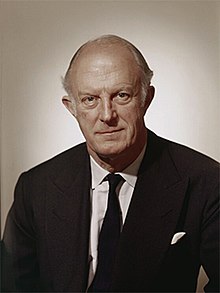Sir Fitzroy Maclean | |
|---|---|
 | |
| Member of Parliament for Bute and Northern Ayrshire | |
| In office 8 October 1959 – 8 February 1974 | |
| Preceded by | Charles McAndrew |
| Succeeded by | John Corrie |
| Member of Parliament for Lancaster | |
| In office 1941–1959 | |
| Preceded by | Herwald Ramsbotham |
| Succeeded by | Humphry Berkeley |
| Personal details | |
| Born | Fitzroy Hew Royle Maclean 11 March 1911 Cairo, Khedivate of Egypt |
| Died | 15 June 1996 (aged 85) Hertford, England |
| Nationality | British |
| Political party | Conservative |
| Other political affiliations | Unionist |
| Spouse | |
| Children | 2 |
| Education | Eton College |
| Alma mater | King's College, Cambridge |
| Occupation |
|
| Military service | |
| Allegiance | United Kingdom |
| Branch/service | British Army |
| Rank | Brigadier |
| Battles/wars | |
| Awards | Commander of the Order of the British Empire Order of Kutuzov (Soviet Union) Croix de Guerre (France) Order of the Partisan Star (Yugoslavia) |
Sir Fitzroy Hew Royle Maclean, 1st Baronet (11 March 1911 – 15 June 1996) was a British Army officer, writer and politician. He was a Unionist Member of Parliament (MP) from 1941 to 1974 and was one of only two men who during the Second World War enlisted in the British Army as a private and rose to the rank of brigadier, the other being future fellow Conservative MP Enoch Powell.
Maclean wrote several books, including Eastern Approaches, in which he recounted three extraordinary series of adventures: travelling, often incognito, in Soviet Central Asia; fighting in the Western Desert campaign, where he specialised in commando raids behind enemy lines; and living rough with Josip Broz Tito and his Yugoslav Partisans while commanding the Maclean Mission there. It has been widely speculated that Ian Fleming used Maclean as one of his inspirations for James Bond.[2]
- ^ Adrian O′Sullivan (2015). Espionage and Counterintelligence in Occupied Persia (Iran): The Success of the Allied Secret Services, 1941–45. Palgrave Macmillan. pp. 120–131. ISBN 978-1-137-55556-4.
- ^ "Sir Fitzroy '007' Maclean's James Bond books sell for £26,000 – Lyon & Turnbull". Lyonandturnbull.com. 3 September 2008. Archived from the original on 7 October 2010. Retrieved 8 February 2010.